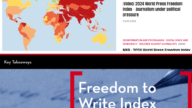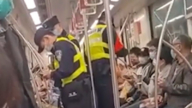【新唐人2011年7月30日讯】7月23号发生的“温州动车事故”,到了28号,中共当局才第一次对外界承认事故原因,是“信号系统设计问题”导致追尾。而在背后,为温州南站提供了铁路信号微机监测系统的上市公司“辉煌科技”,也随之浮出水面,从而折射出中国整个铁路信号系统领域存在的垄断与暴利。
“温州动车追尾”特大事故,酿成超过两百多人死伤的惨剧,外界一直在关注事故的原因。28号,中共国务院调查组作出事故原因的初步报告,承认温州南站信号设备设计有严重缺陷,没有给后车提供应有的信号。
当局公布的事故原因,让提供温州火车南站铁路信号系统的“辉煌科技公司”,陷入了质疑。
“辉煌科技”董事会秘书李新建在接受大陆媒体《第一财经日报》采访时,拒绝承认“辉煌科技”与这次“动车追尾事故”有直接关系。因为事故列车D3115与D301上所使用的信号系统设备,并不是他们提供的。
但是,“辉煌科技”在整个铁路信号微机检测系统行业,拥有40%以上的市场占有率,还是让它还是成为了媒体质疑的聚焦点。
原德国ABB公司自动化部副总裁、自动化工程师吴文昕:“这么多互相竞争的公司情况下,某一个公司能够达到40%,按照我看到的‘辉煌科技公司’是40%,单单在这种产品的40%的那个占有率,那是异常的高、非常的高。”
根据“辉煌科技”2010年年报,平安证券分析师马先文甚至预计,公司这个系统有望在今年(2011年)将份额提升至60%左右。
吴文昕:“那为什么辉煌公司可以达到这个占有率呢?是不是因为它在竞争的时候,通过一些不法的手段,来拿到订单呢?这个当然我现在没有可能去中国大陆进行仔细的调查,我只可以说,理论上我们要想到,比如说那些反垄断部门的官员们,她应该要注意了,是不是这个公司通过行贿的办法,通过非常腐败的办法,来拿到那些订单呢?”
此外,《第一财经日报》引述业内人士的话透露,目前除“辉煌科技”外,其他厂家主要有“铁道科学研究院”通信信号研究所、“卡斯柯信号有限公司”以及“北京世纪瑞尔技术股份有限公司”等,上述四家公司占据了整个行业近50%的市场份额。
英国《金融时报》专栏作家叶檀也注意到了上述的四家公司。她在文章《动车事故折射体制弊端》中透露,依靠垄断铁路行车安全监控系统进入资本市场的A股上市公司“世纪瑞尔”,它的高层有不小的来头,与铁路部门和央企等存在千丝万缕的关系。
而在近期披露的铁道部2010年年报显示,截至去年底,铁道部总负债合计1.89万亿元,同比增长45.14%;资产负债率57.44%,去年末累计亏损772亿元。在今年一季度,铁道部就已经亏损了37.6亿元。
另外,今年6月被“双规”的铁道部运输局副局长苏顺虎,是近一年来铁道部落马的第八位高官。
新唐人记者常春、李静、李若琳采访报导。
Monopoly in Railway Signal Industry
The Chinese Communist Party (CCP) regime announced
on July 28 for the first time that
the reason for the high-speed train rear-end crash on July 23
was related to the design problems of the rail signal system.
The company, Splendor Science & Technology Co. Ltd.,
which provided the railway signal microcomputer system
to the Wenzhou South Station, is under spotlight.
This has drawn the public attention to the issues of
market monopoly and humongous profits
in China’s railway signal industry.
The major accident of Wenzhou high-speed train
has caused over 200 casualties.
The public has been concerned with
the cause of the accident.
On July 28, the State Council investigation squad
made a preliminary report on the cause,
admitting that the design of the signal system
of Wenzhou South Station had serious loopholes.
It did not provide sufficient signals
to the train that rear-ended in the way it was supposed to.
The accident cause announced by the authorities
has put the signal system’s supplier,
Splendor Science & Technology Co., Ltd.,
under spotlight and questioning.
Secretary of the Board of Directors of this company
Li Xinjian denied any direct links between the company
and the accident in an interview with “First Financial Daily."
He said the signal equipment in the crashed trains,
D3115 and D301, was not supplied by the company.
Nevertheless, this company has a 40% market share
in China’s railway signal industry,
making it a focus of media focus and questioning.
Wu Wenxin, an automation engineer and
former VP of ABB in Germany:
“With such an intense competition,
a company like Splendor can attain a 40% market share.
To me, it is unusually high, very high."
According to Splendor’s 2010 financial report,
Ping An Securities analyst Ma Xianwen estimated that
it is hopeful for Splendor’s market share
to increase to 60% in 2011.
Wu Wenxin: “How could Splendor attain such a market share?
Did it obtain orders by any illegal means?
Of course, it is not possible for me to go to China
to conduct an investigation.
Chinese anti-corruption officials should pay attention
to any possible illegal conducts of this company,
e.g., bribery, in order to obtain orders."
First Financial Daily also quoted informants saying that,
besides Splendor Science and Technology,
other railway signal suppliers include
Signal and Communication Research Institute,
CASCO and Century Real in Beijing.
These four firms occupy nearly 50% of
the market share in China.
Ye Tan, a columnist of British “Financial Times",
has also noticed these four companies.
In an article, she revealed that Century Real,
an A-stock listed firm that monopolizes
China’s rail security monitoring system,
is well connected to high-level officials in the railway system
and enterprises owned by the CCP’s central government.
The 2010 annual report of the Ministry of Railways
indicated that, as of the end of 2010,
the total debt of the ministry amounted to RMB 1.89 trillion,
which was a 45.14% increase from 2009.
Its debt ratio was 57.44%.
In 2010 alone, it lost RMB 77.2 billion.
In 2011 Q1,
it already went into a deficit of RMB 3.76 billion.
In June 2011, associate director of transportation of the
Railways Ministry, Su Shunhu, was arrested for corruption.
He is the 8th arrested high-ranking official in this Ministry
in the past year.
NTD reporters Chang Chun, Li Jing and Li Ruolin.































